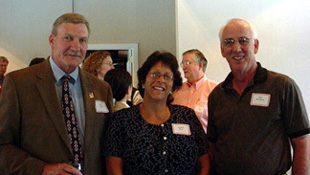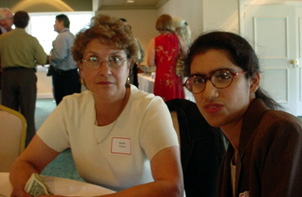 |
Magda Peck, Sc.D., director of the new UNMC/UNO Graduate Program in Public Health .center, with Garry McKee, U.S. Department of Agriculture far left, and Dick Raymond, M.D., chief medical officer, Nebraska Health and Human Services System. The two were some of the guests who celebrated the recent accreditation of a UNMC and University of Nebraska at Omaha Master of Public Health Program. |
The accrediting body awarded the program accreditation for five years, the maximum period allowed. Accreditation is voluntary.
“When you get accredited, it’s a stamp of approval. It shows we’ve met national standards,” said Magda Peck, Sc.D., director of the new UNMC/UNO Graduate Program in Public Health. “The degree will mean something no matter where in the world our students practice. It also means our program joined the dozens of others in the country that meet a certain level of excellence.
“Our graduate degree in public health brings together the talents and the resources of UNMC and UNO,” Dr. Peck said. “It’s amazing how people came together to make this happen. We put the best of both campuses together against a backdrop of demand and urgency for skilled public health practitioners. Students helped, faculty from many disciplines helped, community agencies across the state helped, state and local government helped.”
 |
Also attending the accreditation celebration were: Randi Nelson, a student in the UNMC and University of Nebraska at Omaha Master of Public Health Program; and Resmi Chakkalakal, who will begin the program in August. |
“We were able to complete the process in about 15 months,” Dr. Peck said. “That’s faster than many, but we really knew it was important. When we learned we received approval and that they chose to give us the maximum number of years of being accredited, we were quite surprised.”
B.J. Reed, Ph.D., dean of the UNO College of Public Affairs and Community Service, and faculty member, is part of the group that began discussions about starting the program more than 15 years ago. “It has been a substantial undertaking and amazing to get accreditation that fast,” he said. “It’s a pretty amazing feat.”
Rubens Pamies, M.D., UNMC vice chancellor for academic affairs and dean for graduate studies, said reports on the accreditation were outstanding. “This confirms the program is one of merit,” he said.
John Christensen, Ph.D., UNO vice chancellor for academic affairs, also praised the UNO/UNMC team for the accreditation success. “This is one of the best site visit reports I’ve ever seen.”
Dr. Peck said UNMC Chancellor Harold M. Maurer, M.D., and Nancy Belck, UNO chancellor, made the new degree possible.
“Without their vision and leadership, this would not have gotten off the ground,” she said. “Together we’ve built a great foundation for graduate education in public health from the strengths of our two campuses.”
The program educates and trains students to become public health professionals. About 40 faculty make up the program from the UNO and UNMC campuses, including areas of medicine, nursing, public administration, social work, business administration, sociology, and health, physical education and recreation.
Two specialties – community health education and health administration — are offered. Community health education encompasses educating communities on what they need to know to keep healthy. Health administration includes educating and training students to design and administer public health programs that use taxpayer dollars wisely and efficiently.
In general, public health is focused on promoting, protecting and advocating for the public’s health. Public health addresses physical, mental and environmental health concerns of communities and populations at risk for disease and injury.
Dick Raymond, M.D., chief medical officer, Nebraska Health and Human Services System, said the increase in depth and breadth of public health is needed to drive health policy. “It’s important to have this resource in the state,” he said. “If this weren’t available, Nebraskans leaving the state to pursue this kind of degree might not come back.”
Since January 2002, more than 70 students have enrolled in the MPH program’s health administration or community health education tracks. Twelve more students will earn their degree by the end of this summer.
“I’ve always been fascinated with health and health-related things,” said Resmi Chakkalakal, who will begin the program in August. “I plan to work in an organization in which I’ll be working on developing health policies.”
Meanwhile, Randi Nelson is in the program and works in the public health lab at The Nebraska Medical Center. “It’s all related to what I do,” said Nelson, who markets lab services.
The general public may not fully understand what public health is, but they see examples of it almost every day. In general, public health is about creating the conditions necessary for all people to be healthy.
“Medicine focuses on the diagnosis and treatment parts of health care,” Dr. Peck said. “Public health makes sure it’s comprehensive, including prevention, education and outreach. Think of public health as an embrace. It doesn’t wait for you to come, it comes out to you. Public health providers sometimes are called physicians for the whole community.”
For more information, call Valdeen Nelsen, MPH program coordinator, at (402) 561-7586.